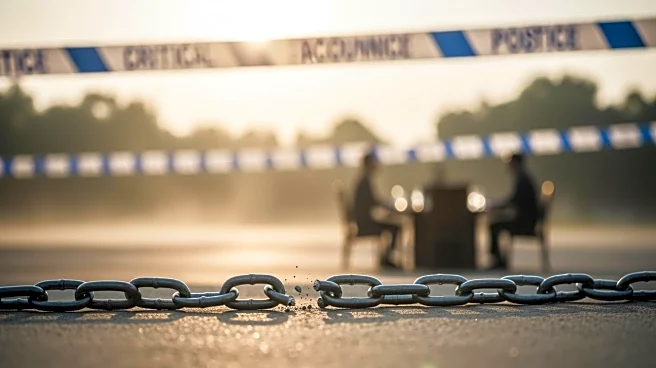What's Happening?
A pro-Palestinian organization in Europe has filed a criminal complaint in Germany against a German-Israeli soldier, accusing him of war crimes and crimes against humanity during the conflict in Gaza.
The soldier, identified as C., served as a combat engineer in the IDF's 551st Brigade and participated in Operation Oz VeNir, aimed at capturing Hamas gunmen. The complaint alleges that C. documented his activities on social media, showing demolitions of Palestinian infrastructure and celebrating the destruction. The operation reportedly led to significant devastation in the town of Khuza'a, including the destruction of homes, schools, and mosques.
Why It's Important?
The complaint against the IDF soldier highlights the international scrutiny and legal challenges faced by military personnel involved in conflicts. It underscores the potential for legal actions against individuals accused of war crimes, which can impact diplomatic relations and public perceptions of military operations. The case may influence how countries address allegations of war crimes and the accountability of soldiers in international conflicts. It also reflects ongoing tensions between pro-Palestinian groups and Israel, potentially affecting international support and policy decisions regarding the Israeli-Palestinian conflict.
What's Next?
German authorities may decide to investigate the complaint, which could lead to legal proceedings against the soldier. This action might prompt other countries to consider similar legal measures against individuals involved in the conflict. The case could also influence international discussions on war crimes and the responsibilities of military personnel. If the investigation proceeds, it may result in diplomatic tensions between Germany and Israel, affecting bilateral relations and cooperation. Additionally, the complaint could lead to increased advocacy and legal efforts by pro-Palestinian groups targeting Israeli military actions.
Beyond the Headlines
The complaint raises broader questions about the ethics of warfare and the documentation of military actions on social media. It highlights the role of digital platforms in shaping narratives and evidence in legal cases related to conflicts. The case may prompt discussions on the responsibilities of soldiers in documenting their activities and the implications of such documentation for international law. It also reflects the growing influence of non-governmental organizations in pursuing legal actions against alleged war crimes, potentially shaping future legal frameworks and accountability measures.










